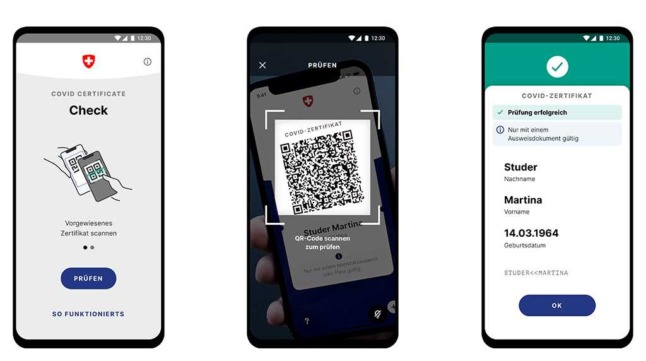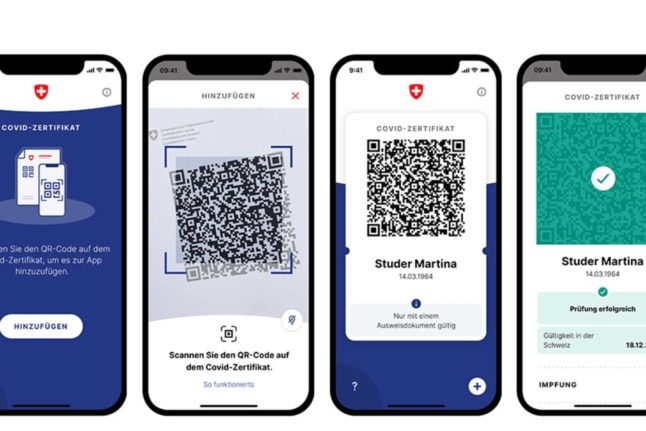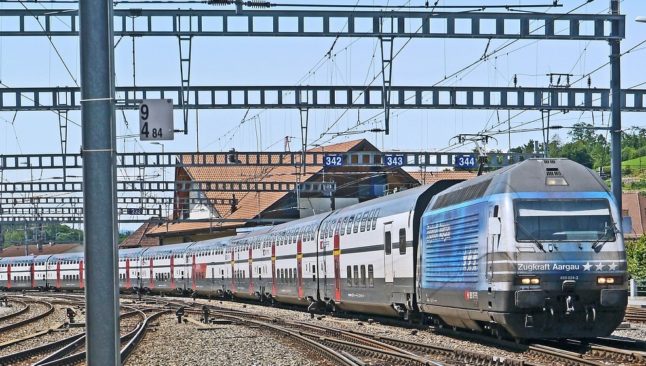On Monday, June 7th, Switzerland finally released its Covid-19 certificate, which will provide certain rights and privileges to holders for travel and events.
The Covid-19 certificate – otherwise known as the Covid-19 pass or the green pass – is available in paper and digital form.
According to the Swiss government, the pass “provides documentary evidence that you have had a COVID-19 vaccination, have had and recovered from the disease or have tested negative”.
More information about what the pass allows holders to do can be found at the following link.
UPDATED: Everything you need to know about the ‘green pass’, Switzerland’s coronavirus immunity card
What is the Covid certificate?
The Covid-19 certificate – otherwise known as the Covid-19 pass or the green pass – is available in paper and digital form.
According to the Swiss government, the pass “provides documentary evidence that you have had a COVID-19 vaccination, have recovered from the disease or have tested negative”.
What will the certificate look like?
The Covid-19 certificate will be issued to you in paper and electronic form, which will either be as a printed out certificate or as a QR code which you can scan into Switzerland’s Covid Certificate App to carry and display from your mobile device.
While this is a cantonal responsibility, you will generally be given a paper copy of your vaccination certificate while also being sent the electronic version.
Besides the person’s first and last names, date of birth and a certificate number, the COVID certificate contains details of their COVID-19 vaccination, recovery, or negative PCR or rapid antigen test.
The heart of the certificate is the QR code.
In both cases, they will be accompanied by an official government electronic signature to prevent forgery.
Authorities said holders may also need to show their ID or passport when presenting the certificate.
The digital system comprises in particular a storage application (Covid Certificate) and a verification application (Covid Certificate Check), the government said.
Both apps are available for free. Here is the link for the Apple App store here, and that for Android. 
Switzerland’s Covid-19 certificate app up close. Image: FOPH
Where can I get the Covid-19 certificate?
You get the certificate in the place in which you were vaccinated, recovered from the virus or tested negative.
This means you can get the certificate at any of the following locations: Vaccination centres, medical practices, hospitals, pharmacies, test centres and laboratories.
If you have already been fully vaccinated and did not receive a QR code, you must contact cantonal authorities to get the certificate.
If you have recovered from the virus, you will also need to contact your canton. You will need to have had the virus and recovered in the previous six months – and you will need documentary evidence of this.
READ MORE: How do you prove you’ve recovered from Covid in Switzerland?
For people who test negative, you will be given a certificate.
Both PCR and antigen tests apply here, although the validity differs.
A negative PCR test is valid for 72 hours, while a negative antigen test is valid for 48 hours.
Self tests are not valid for the certificate.
While you will get a paper print out with a negative test in most cases, you can also get it displayed on the Covid Certificate App by scanning in your QR code.
The app – which is different to the Swiss Covid tracing app – is available here for Google/Android phones and here for Apple phones.
You can scan the QR code into the app, then it will be recorded there and you can use it as you would the paper slip.
How will this allow me to travel?
Yes.
As of Friday, July 9th, Switzerland’s Covid certificate has become a part of the EU travel framework.
The European Union and Switzerland will recognise each other’s Covid vaccination certificates from Friday, July 9th.
This means you do not need to get an additional app – you can use your Swiss Covid Certificate app to travel in the EU.
More information about this is available at the following link.
EXPLAINED: How to use Switzerland’s Covid app when travelling in the EU



 Please whitelist us to continue reading.
Please whitelist us to continue reading.
How can US visitors fully vaccinated with the Moderna vaccine in the US get a Swiss COVID 19 certificate ?We are visiting Switzerland in a week, we would appreciate any help you can provide. Thank you.
Hi,
We are traveling to Switzerland in a week and had the same question about receiving the Swiss Covid 19 certificate. I was wondering if you ever sorted this out and had a solution you could share?
I’m going to be in Switzerland for a couple of weeks in October. Does anyone know if the NHS app (U.K.), proving I’m doubly vaccinated, will be accepted in cafes, restaurants? I’d be very grateful for any info.
Thks